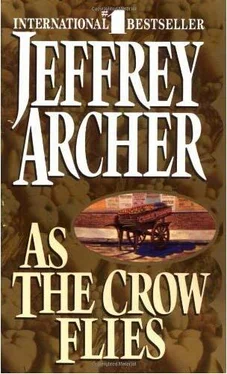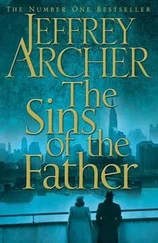"So what am I expected to do?"
"I don't know, Charlie, and I don't care. But whatever you do it's no longer going to take place anywhere near Chelsea Terrace. Do I make myself clear?"
Charlie would have replied if a deck officer hadn't come to a halt beside them.
"Sorry to interrupt you, sir."
"You're not interrupting anything," said Charlie. "So what do you want me to do? Arrange a mutiny or organize the deck tennis draw?"
"Both those are the purser's responsibility, Sir Charles," said the young man. "But the captain wonders if you would be kind enough to join him on the bridge. He's received a cablegram from London which he feels you would want to know about immediately."
"I hope it's not bad news," said Becky, as she sat up quickly and placed the novel she had been trying to read on the deck beside her. "I told them not to contact us unless it was an emergency."
"Rubbish," said Charlie. "You're such an old pessimist. With you a bottle is always half empty." He stood up and stretched himself before accompanying the young officer along the afterdeck towards the bridge, explaining how he would organize a mutiny. Becky followed a yard behind, offering no further comment.
As the officer escorted them onto the bridge the captain turned to greet them.
"A cablegram has just come over the wires from London, Sir Charles, which I thought you would want to see immediately." He handed the message over.
"Damn, I've left my glasses back on the deck," Charlie mumbled. "Becky, you'd better read it to me." He passed the slip of paper to his wife.
Becky opened the cablegram, her fingers trembling slightly, and read the message to herself first as Charlie studied his wife's face for a clue as to its contents.
"Come on then, what is it? Half full or half empty?"
"It's a request from Buckingham Palace," she replied.
"What did I tell you," said Charlie, "you can't leave them to do anything for themselves. First day of the month, bath soap, she prefers lavender; toothpaste, he likes Colgate, and loo paper.. . . I did warn Cathy—"
"No, I don't think it's the loo paper Her Majesty is fussing about on this occasion," said Becky.
"So what's the problem?" asked Charlie.
"They want to know what title you'll take."
"Title?" said Charlie.
"Yes," said Becky, turning to face her husband. "Lord Trumper of where?"
Becky was surprised and Cathy somewhat relieved to discover how quickly Lord Trumper of Whitechapel appeared to become absorbed in the daily workings of the Upper House. Becky's fears of his continually interfering with the day-to-day business of the company evaporated the moment Charlie had donned the red ermine. For his wife, the routine brought back memories of those days during the Second World War when Charlie had worked under Lord Woolton in the Ministry of Food and she could never be sure what time of night he'd arrive home.
Six months after being told by Becky he was not to no anywhere near Trumper's, Charlie announced that he had been invited to become a member of the Agricultural Committee, where he felt he could once again use his expertise to the benefit of his fellow members. He even resumed to his old routine of rising at four-thirty each morning so that he could catch up with those parliamentary papers that always needed to be read before important meetings.
Whenever Charlie resumed home for dinner in the evening he was always full of news about some clause he had proposed in committee that day, or how an old duffer had taken up the House's time during the afternoon with countless amendments to the hare coursing bill.
When in 1970 Britain applied to join the Common Market Charlie told his wife that he had been approached by the chief whip to chair a subcommittee on food distribution in Europe and felt it was his duty to accept. From that day on, whenever Becky came down for breakfast she would discover countless order papers or copies of the Lords' daily Hansard strewn untidily all the way from Charlie's study to the kitchen, where the inevitable note had been left to explain that he had to attend yet another early subcommittee meeting or briefing from some continental supporter of Britain's entry into Europe who happened to be in London. Until then Becky had no idea how hard members of the Upper House were expected to work.
Becky continued to keep in touch with Trumper's by regular Monday morning visits. She would always go in at a time when business was fairly quiet, and to her surprise had become Charlie's main source of information as to what was happening at the store.
She always enjoyed spending a couple of hours strolling through the different departments. She couldn't help noticing how quickly fashions changed, and how Cathy always managed to keep a step ahead of her rivals, while never giving regular customers cause to grumble about unnecessary change.
Becky's final call was inevitably at the auction house to see whose paintings were due to come under the hammer. It had been some time since she had handed over her responsibility to Richard Cartwright, the former chief auctioneer, but he always made himself available to show her round the latest preview of pictures to be auctioned. "Minor Impressionists on this occasion," he assured her.
"Now at major prices," Becky replied as she studied works by Pissarro, Bonnard and Vuillard. "But we'll still have to make sure Charlie doesn't find out about this lot."
"He already has," Richard warned her. "Dropped in last Thursday on his way to the Lords, put a reserve on three lots and even found time to complain about our estimates. Claimed he had bought a large Renoir oil from you called L'homme a la peche only a few years ago for the price I was now expecting him to pay for a small pastel by Pissarro that was nothing more than a study for a major work."
"I suspect he might be right about that," said Becky as she flicked through the catalogue to check the different estimates. "And heaven help your balance sheet if he finds out that you failed to reach the reserve price on any picture he's interested in. When I ran this department he was always known as 'our loss leader.'"
As they were chatting an assistant walked over to join them, nodded politely to Lady Trumper and handed Richard a note. He studied the message before turning to Becky. "The chairman wonders if you would be kind enough to drop in and see her before you leave. Something she needs to discuss with you fairly urgently."
Richard accompanied her to the lift on the ground floor, where Becky thanked him once again for indulging an old lady.
As the lift traveled grudgingly upwards—something else that Cathy wanted to change as part of the refurbishment plan—Becky pondered on why the chairman could possibly want to see her and only hoped that she wasn't going to have to cancel dinner with them that night, as their guests were to be Joseph and Barbara Field.
Although Cathy had moved out of Eaton Square some eighteen months before into a spacious flat in Chelsea Cloisters they still managed dinner together at least once a month, and Cathy was always invited back to the house whenever the Fields or the Bloomingdales were in town. Becky knew that Joseph Field, who still sat on the board of the great Chicago store, would be disappointed if Cathy was unable to keep her appointment that night, especially as the American couple was due to return home the following day.
Jessica ushered Becky straight through to the chairman's office, where she found Cathy on the phone, her brow unusually furrowed. While she waited for the chairman to finish her call, Becky stared out of the bay window at the empty wooden bench on the far side of the road and thought of Charlie, who had happily swapped it for the red leather benches of the House of Lords.
Читать дальше












